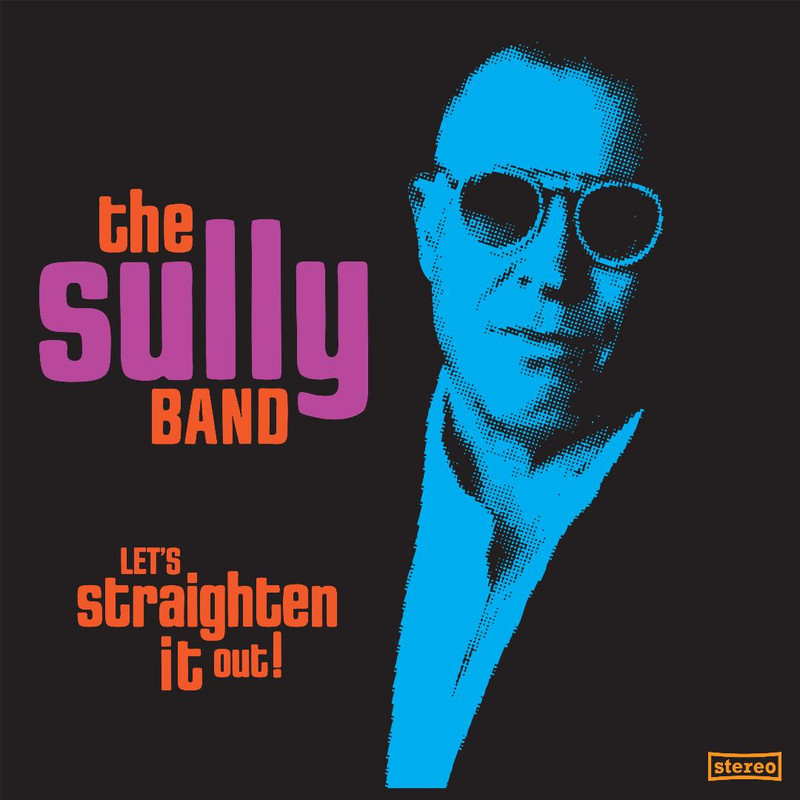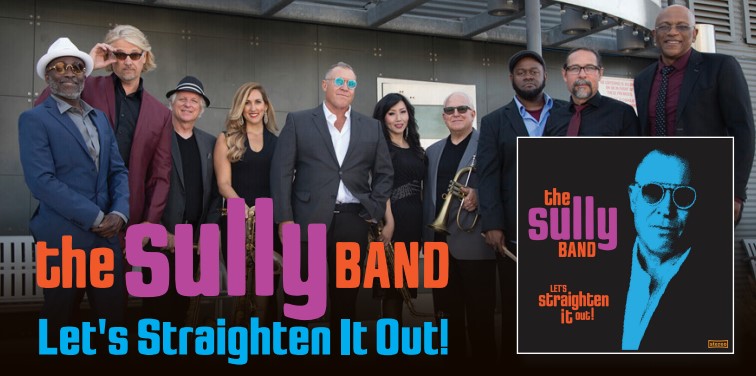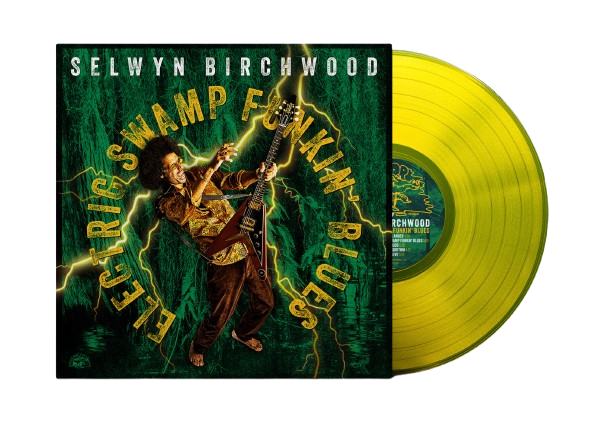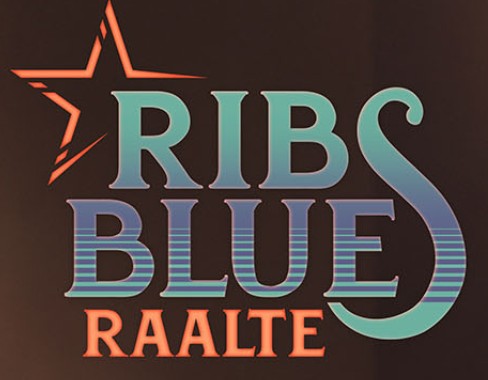
The Sully Band " Lets Straighten It Out!
Impacting Now
A platter of 10 classic soul and R&B rave-ups is served up hot on the debut album from this well-oiled San Diego band fronted by Bob “Sully” Sullivan, a do-it-yourself entrepreneur, national radio and TV host who channels his powers of persuasion into the role of magnetic frontman.
Recorded at the legendary Henson Recording Studio (formerly A&M Studios) in Hollywood with multiple Grammy Award-winning producer Chris Goldsmith (Blind Boys of Alabama, Charlie Musselwhite, Ben Harper) and Grammy-winning bassist James East as musical director, “Let’s Straighten It Out” captures the band’s show-stopping magic.
If You Love Me Like You Say (3:16)
A classic tune from the late “Iceman” Albert Collins, the song is given a decidedly New Orleans vibe on this soulful version from The Sully Band, San Diego’s “Best Band” of 2020 (SD Music Awards). One part horn-driven Chicago blues rock, and one part Mardi Gras parade, this unique reworking sounds both fresh and classic. The 9-piece Sully Band holed up in the old A&M studio to knock this tune out with then-20 year-old wonder Anthony Cullins on lead guitar and Sully Band keyboardist Mark Hattersley channeling Professor Longhair, and the whole band supporting a growling vocal from the man Sully himself.

When The Battle Is Over (4:58)
This hidden Dr. John-penned gem, originally recorded as one-sided boast by Delaney & Bonnie (and later by Aretha), is given a fun and funky update by The Sully Band. The top-notch 10-piece band from San Diego has flipped the tune into a rollicking duet between Sully and the soulful Rebecca Jade."
If I Could Only Be Sure (4:32)
Nolan Porter’s forgotten classic “If I Could Only Be Sure,” originally released in 1972, gets another shot at the limelight with this dynamic new version from The Sully Band. Nolan, a respected singer from the early days of soul who just passed away last February, is given a fitting tribute. The bluesy tune features Sully's aching vocal and a haunting guitar line, supported by a driving rhythm section led by Grammy-winning bassist (and musical director) James East.
Track Listing
Interview: By Polly O’Keary
This example displays a simple translate button, with no text.
Bob “Sully” Sullivan is one of the most highly sought stage personalities in the United States. But until now, his role has been as a keynote speaker; a very successful finance entrepreneur and television and radio personality who shares his techniques for success in business with other entrepreneurs. Sully is also a nationally syndicated radio/television talk-host, and his shows “The Big Biz Show” and “Sully’s Biz Brew” are broadcast in 175 countries.
Now, with the release of the album Let’s Straighten it
Out, he plans to capture another world of stages and microphones, bringing
his high-powered 10-piece San Diego project The Sully Band to blues and R&B
venues worldwide. Here, Sully talks about his life-long love affair with music,
how he built a band of Grammy-winning musicians into one of the top acts in
Southern California, and the process of recording his debut album Let’s
Straighten It Out, on Blue Elan Records.
Polly: Tell us a little bit about your
history in music. How did you come to be a performer and an artist?
Sully: It started as I was kid. My
parents were divorced, and I had a really fun dad. He was also the guy that was
listening to Otis Redding when everybody else was listening to The Doors. He's
the guy that was listening to the real blues guys when the world was listening
to The Monkees, and I, as a little kid, was really influenced by that. I've
actually asked myself this a couple of times. Why am I so moved when I hear
some of these songs, like, I can't turn it off? It's like, it's kind of like
inserted in the DNA somehow. The first song I ever played on guitar was
“Sitting on the Dock of the Bay.”
Polly: How old were you?
Sully: Probably 9. I was trained as a
classical guitarist. I did performances where they prop you up front in a chair
and you play in front of the women's club, those type of things. In the off
hours I was learning how to play bar chords and Otis Redding and Muddy Waters,
the guys that were generally thought of as the real blues men and the real
R&B guys. I would gravitate at the time to Jackson Brown, Loggins and
Messina, James Taylor, because they were guitarists and singer-songwriters. So
that's kind of how it started.
Polly: When did you start to perform
seriously?
Sully: I gravitated towards musical
theater, and I ended up being the lead in every single sort of school and
community theater. I was the leading man in shows like Oklahoma or Bye
Bye Birdie or Brigadoon or West Side Story. After high school
and college, I was one of those Gordon Lightfoot kind of singer-songwriters in
the seventies, and I got a development deal with what was Island Records back
then, which went nowhere, because that's what happens (laughs). And I kind of
wrapped it up, and I found an entrepreneurial spirit and started several
businesses.
Polly: You have certainly been
successful in business. What brought you back to music?
Sully: Fast forward to 2003. A friend
of mine was playing in a worship band at a church in San Diego. I got up there
and started performing and the next thing you know, my friend gets sick and I’m
the worship leader for seven years. That's how the band started. I got us a
date downtown at the House of Blues. And next thing you know, we got really
popular really fast as this cover band that did some originals.
Polly: When did you start recording
with the band?
Sully: I started writing some songs
with James East, he's our bass player and now our music director. He's the
brother of Nathan East, who's arguably the most recorded bass player in the
history of music. He's also the brother of Marcel East, who's a Grammy
Award-winning producer. In 2017, I think, Marcel had us lay down several
tracks, which can now be found as singles on Spotify under Sully and the
Souljahs. On those tracks we had Steve
Ferrone, who was a long-time drummer for Tom Petty and one of the founding
members of the Average White Band. We had Nathan East on that album, Tim Carmon
on B3 from Eric Clapton, and so we had kind of a good little all-star set of
studio guys that helped us get it out there. And there was a little bit of
critical acclaim. And then in 2020, we were teed up to do a ton of gigs and
suddenly there was no gigs. In 2021, we started once again getting booked
everywhere. And that's when we decided to do the Let's Straighten It Out album.
Polly: You recorded this album with
Chris Goldsmith, another San Diego guy, who has worked with the Blind Boys
of Alabama, Aaron Neville, and Chrissie Hynde, among others. How did that
collaboration come about?
Sully: We started working together
during the pandemic on livestreams from [Chris’s club] the Belly Up and enjoyed
working together so we decided to take it to the next level. And of course,
Chris is a multi-Grammy Award-winning producer. We went up to where they
recorded “We Are the World,” it was formerly A&M records. Now it’s called Henson
Recording, from the Muppets’ Jim Henson.
You pull in the driveway and there's Kermit. And we came up with this album
that has songs in a chronological order that kind of tells a story about two
people going through a relationship and figuring out how they are gonna deal
with it.
Polly: The album starts with Aretha’s
“When the Battle is Over.”
Sully: It's almost a prologue to a
story. It's two people that are like, there's a battle here. And then we went
from there through a little bit of a storyline. I think you have to use your
own imagination as you're listening through it, but it goes from, I am addicted
to this woman and I'm gonna do anything. And then to [Albert Collins’] “If You
Love Me Like You Say,” you know, why are you hammering me?
Polly: And then it finishes with
[Latimore’s] “Let’s Straighten It Out” and then [Jackie Wilson’s]“Higher and
Higher.”
Sully: Yeah, “Higher and Higher,” it’s
like the end of a movie, you know when the credits roll. The second I heard how
Chris wanted to do it was like, okay, I get it, this is the wrapping of the bow
around this story.
Polly: I know you write music, but this
album doesn’t have originals on it. Tell me how you pick music to record. What
draws you to a piece of music and then how do you make it your own?
Sully: That is a great question. So you
know when you hear a song, like, [sings a Jackson Five groove] or [sings the
groove from The Beatle’s “Come Together”]. There's that thing that hits you in
the back of the jaw. And we play it straight the first time and once we got it
down then we started adding, right? Like, there's a song we do called “Best Damn Fool,” by Buddy Guy. And instead of a blues guitar we have a horn
lick in there. And the first thing you hear is a Jamaican dude start rapping,
and suddenly you've got this entirely engaged audience listening. For us,
writing and performing are one and the same. It continues when we're on stage.
It's one nonstop writing session with us.
Polly: You have a very busy career in
business and other arenas. How do you make room for music in your professional
life?
Sully: I do spend half my life in
investment banking and media. I did in 2019, like, 45 keynote speeches on
negotiation. So I've learned how to be exceptionally efficient. If you waste 10
minutes of my time per day, that's 61 hours a year. I learned how to really be
non-negotiable about my day. So from 4:20 to 7:30 in the morning, I'm on radio
in San Diego and L.A. From 8 to 9 I’m working out. We record our national
television show every day from 11:15 to 1:15, and I’m done at 1:30 and then we
rehearse. I can write you a good song and make you a
good cioppino, and then do a TV and a radio program and then cut a $5 million
deal before 3 and call it a Tuesday. I don't know if I could survive if I'm not juggling
kittens. I don’t know what I would do.
Polly: What are your goals for music,
and for this album?
Sully: I think what people don't
understand about the music industry is that you don't have to be Jesus-famous
to be successful. We opened up for Tommy Castro a couple months ago, you can be
like Tommy Castro. We're start to get booked at places like Antone’s in Austin
and the blues festivals, and that's what we wanna do. I dig playing in front of
a big pile of people, where, you know, you got your baby, you got your blanket,
you got your bucket of beer. That's super fun. Wherever we are, let's like,
make this place blow up. And we typically do.
Let’s Straighten It Out will be released March 18. For more information about the band and the album, see www.sullyband.com.
Polly O’Keary is an award-winning and nationally touring blues bassist, singer, and songwriter, as well as a journalist and a PhD candidate in the field of communication. She has won many awards for news and entertainment writing, and currently teaches media writing at the University of Washington, Seattle.
Frank Roszak
www.frankroszakpromotions.com








Geen opmerkingen:
Een reactie posten